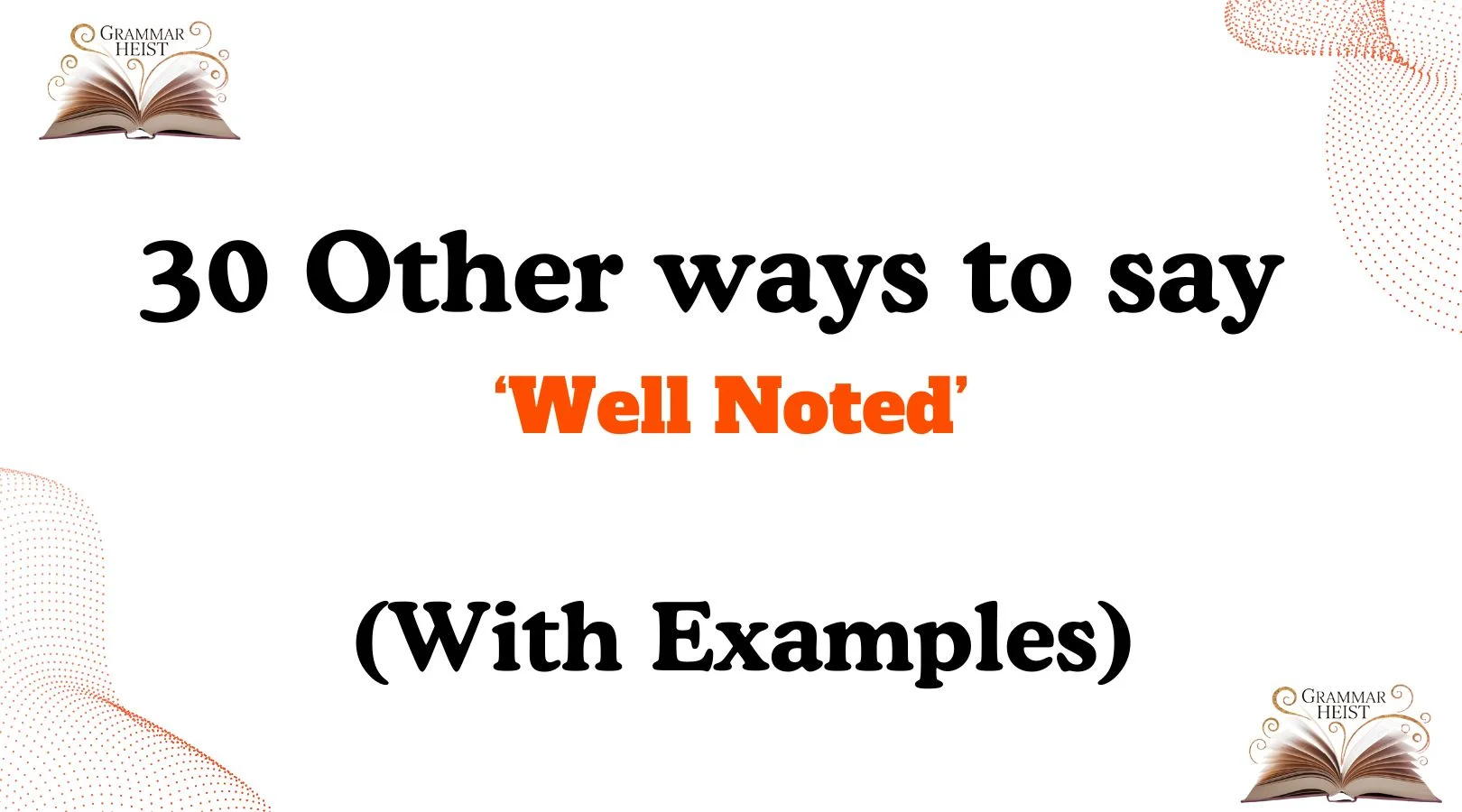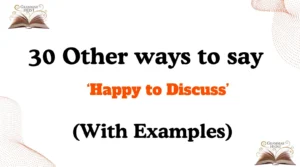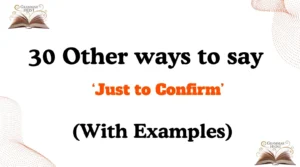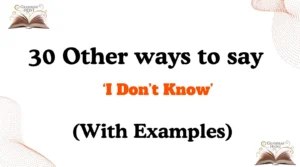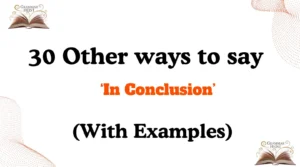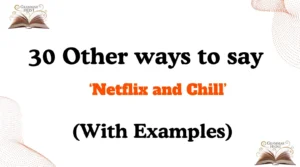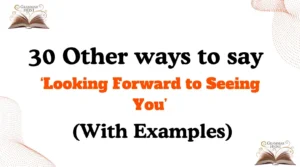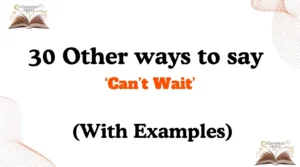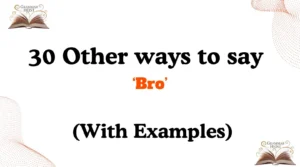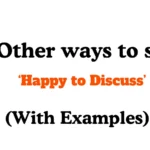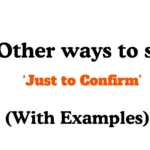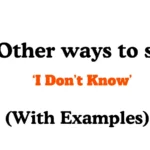Finding the right words to express understanding and acknowledgment can make your conversations feel more thoughtful and caring. While “Well Noted” is polite and professional, using alternative phrases can add warmth and a personal touch to your communication. Whether you’re writing an email, chatting with colleagues, or replying to a friend, these 30 other ways to say “Well Noted” will help you sound more genuine, attentive, and emotionally intelligent.
What Does “Well Noted” Mean?
The phrase “Well Noted” simply means that you’ve received, understood, and acknowledged information. It’s often used in formal or professional settings to confirm that someone’s message, request, or instruction has been read and understood. However, while it’s clear and concise, it can sometimes sound a little cold or robotic if used too often.
Is It Professional/Polite to Say “Well Noted”?
Yes, “Well Noted” is both professional and polite. It’s perfect for business emails, reports, or work messages. However, in more personal or casual situations, it can feel distant. Using warmer alternatives can help you sound more engaging and emotionally aware while keeping the message clear and respectful.
Pros or Cons of Saying “Well Noted”
Pros:
- Professional and concise
- Clearly shows understanding
- Suitable for formal communication
Cons:
- Can sound too stiff or impersonal
- Lacks emotional warmth
- Not ideal for casual or friendly messages
Synonyms For “Well Noted”
- Got it
- Understood
- Acknowledged
- Noted with thanks
- Thanks for the update
- I’ve taken note of that
- Will do
- Makes sense
- I’ll keep that in mind
- Copy that
- I understand
- Sounds good
- Appreciated
- I’ll take note of that
- All clear
- Got your message
- Point taken
- Thanks, I got it
- Sure thing
- That works for me
- Noted, I’ll follow through
- Absolutely
- I’ll handle it
- Fine by me
- Thanks for letting me know
- Consider it done
- Crystal clear
- I’m on it
- I see what you mean
- Got your point
1. Got it
Scenario: When confirming you’ve received clear instructions.
Examples:
- Got it, I’ll take care of that by tomorrow.
- Got it! Thanks for letting me know.
- Got it — I’ll follow up with the team.
Tone: Friendly and relaxed.
Explanation: Perfect for informal or semi-formal settings. Shows understanding without sounding robotic.
2. Understood
Scenario: When acknowledging clear directions or feedback.
Examples:
- Understood, I’ll make those changes.
- Understood — thank you for clarifying.
- Completely understood, I’ll handle it accordingly.
Tone: Professional and respectful.
Explanation: Ideal for business communication when you need to sound serious and focused.
3. Acknowledged
Scenario: When confirming receipt of important information.
Examples:
- Acknowledged, I’ll proceed as discussed.
- Acknowledged — I’ll ensure it’s completed on time.
- Acknowledged, and I appreciate the update.
Tone: Formal and precise.
Explanation: Best for corporate or military-style communication where accuracy matters.
4. Noted with thanks
Scenario: When appreciating someone’s message or feedback.
Examples:
- Noted with thanks — I’ll keep it in mind.
- Noted with thanks, appreciate your guidance.
- Noted with thanks, and I’ll act on it soon.
Tone: Polite and courteous.
Explanation: Combines acknowledgment with gratitude, often used in polite email replies.
5. Thanks for the update
Scenario: When someone provides new information.
Examples:
- Thanks for the update, that helps a lot.
- Thanks for the update — I’ll adjust accordingly.
- Thanks for the update, really appreciate it.
Tone: Warm and thankful.
Explanation: Adds appreciation to your acknowledgment, making the reply feel genuine.
6. I’ve taken note of that
Scenario: When showing attentiveness in a professional context.
Examples:
- I’ve taken note of that for our next meeting.
- I’ve taken note of that, thank you.
- I’ve taken note of that and will make adjustments.
Tone: Respectful and sincere.
Explanation: Shows careful listening and consideration — great for formal discussions.
7. Will do
Scenario: When confirming you’ll take action.
Examples:
- Will do — thanks for the reminder!
- Will do, I’ll send it over shortly.
- Will do, noted on my list.
Tone: Friendly and cooperative.
Explanation: Short, positive, and action-oriented — perfect for casual settings.
8. Makes sense
Scenario: When agreeing with an explanation.
Examples:
- Makes sense, thanks for explaining.
- Makes sense — I’ll go with that approach.
- Makes sense now, appreciate the clarity.
Tone: Conversational and understanding.
Explanation: A great alternative that conveys comprehension in a natural way.
9. I’ll keep that in mind
Scenario: When someone gives feedback or advice.
Examples:
- I’ll keep that in mind for next time.
- I’ll keep that in mind — thank you for the insight.
- I’ll keep that in mind when planning ahead.
Tone: Thoughtful and polite.
Explanation: Conveys respect for the other person’s input while sounding warm.
10. Copy that
Scenario: When confirming you’ve heard instructions.
Examples:
- Copy that, I’ll take care of it.
- Copy that — moving forward now.
- Copy that, thanks for confirming.
Tone: Short and assertive.
Explanation: Casual but confident — often used in team communications.
11. I understand
Scenario: When confirming comprehension after someone explains something important.
Examples:
- I understand, thank you for explaining it clearly.
- I understand now — I’ll make the changes needed.
- I understand, and I’ll make sure it’s handled properly.
Tone: Calm and respectful.
Explanation: This phrase shows empathy and emotional intelligence, helping others feel heard and respected.
12. Sounds good
Scenario: When agreeing with a plan or suggestion.
Examples:
- Sounds good, let’s move forward with that.
- Sounds good — I’ll see you then.
- Sounds good, thanks for confirming.
Tone: Friendly and positive.
Explanation: Simple and cheerful, this phrase works well in both professional and personal contexts.
13. Appreciated
Scenario: When you want to acknowledge and thank someone briefly.
Examples:
- Appreciated, thank you for the reminder.
- Appreciated — I’ll take note of that.
- Much appreciated, that was very helpful.
Tone: Grateful and polite.
Explanation: Shows appreciation while keeping your message concise and professional.
14. I’ll take note of that
Scenario: When you want to show that you’re paying attention to details.
Examples:
- I’ll take note of that for future reference.
- I’ll take note of that, thanks for mentioning it.
- I’ll take note of that before sending the final report.
Tone: Sincere and careful.
Explanation: Reflects attentiveness and thoughtfulness — great for both formal and semi-formal settings.
15. All clear
Scenario: When confirming that everything has been understood.
Examples:
- All clear, I’ll start working on it.
- All clear — thanks for explaining.
- All clear from my side.
Tone: Confident and straightforward.
Explanation: Shows that you fully understand the message and are ready to proceed.
16. Got your message
Scenario: When confirming receipt of a message or instruction.
Examples:
- Got your message, I’ll check and reply soon.
- Got your message — thanks for reaching out.
- Got your message, and I’ll follow up shortly.
Tone: Neutral and polite.
Explanation: Clear and efficient way to acknowledge a message without overcomplicating it.
Read More:30 Other Ways to Say ‘Sounds Good’ (With Examples)
17. Point taken
Scenario: When someone shares feedback or a valid opinion.
Examples:
- Point taken, I’ll work on that area.
- Point taken — you’re absolutely right.
- Point taken, I’ll consider it next time.
Tone: Humble and open-minded.
Explanation: Perfect for accepting feedback gracefully and showing emotional maturity.
18. Thanks, I got it
Scenario: When you want to confirm understanding and express gratitude.
Examples:
- Thanks, I got it — that’s very helpful.
- Thanks, I got it. I’ll take it from here.
- Thanks, I got it — appreciate your time.
Tone: Warm and appreciative.
Explanation: Combines acknowledgment and gratitude, creating a friendly yet professional tone.
19. Sure thing
Scenario: When casually agreeing or confirming an action.
Examples:
- Sure thing, I’ll handle that for you.
- Sure thing — I’ll get it done today.
- Sure thing, I’ve got it covered.
Tone: Casual and confident.
Explanation: Common in informal or team settings — upbeat and positive.
20. That works for me
Scenario: When confirming agreement with a plan or schedule.
Examples:
- That works for me — see you at 3 PM.
- That works for me, thanks for checking.
- That works for me, let’s go ahead.
Tone: Cooperative and easygoing.
Explanation: Great for confirming alignment while keeping the tone natural and friendly.
21. Noted, I’ll follow through
Scenario: When you want to show responsibility and commitment.
Examples:
- Noted, I’ll follow through by the deadline.
- Noted, I’ll follow through and keep you updated.
- Noted, I’ll follow through on that request.
Tone: Responsible and professional.
Explanation: Combines acknowledgment with accountability — ideal for work communication.
22. Absolutely
Scenario: When showing full agreement or assurance.
Examples:
- Absolutely, I’ll handle it.
- Absolutely — that makes total sense.
- Absolutely, you can count on me.
Tone: Confident and supportive.
Explanation: Strong yet friendly — adds enthusiasm to your acknowledgment.
23. I’ll handle it
Scenario: When taking ownership of a task.
Examples:
- I’ll handle it — no worries.
- I’ll handle it and send you the update soon.
- I’ll handle it, thanks for trusting me with this.
Tone: Reassuring and proactive.
Explanation: Communicates accountability and confidence — great for teamwork.
24. Fine by me
Scenario: When approving a suggestion or decision.
Examples:
- Fine by me — that plan sounds great.
- Fine by me, let’s go ahead with it.
- Fine by me — I trust your judgment.
Tone: Easygoing and agreeable.
Explanation: Perfect for showing flexibility and open-mindedness in casual settings.
25. Thanks for letting me know
Scenario: When someone informs you about something important.
Examples:
- Thanks for letting me know — I’ll adjust accordingly.
- Thanks for letting me know, appreciate the heads-up.
- Thanks for letting me know — I’ll plan around that.
Tone: Appreciative and warm.
Explanation: A polite way to show gratitude for updates or reminders.
26. Consider it done
Scenario: When confirming a task will be completed.
Examples:
- Consider it done — I’ll handle it today.
- Consider it done, no need to worry.
- Consider it done — you can count on me.
Tone: Confident and reassuring.
Explanation: Expresses reliability and enthusiasm — great for collaborative or service-oriented communication.
27. Crystal clear
Scenario: When confirming complete understanding.
Examples:
- Crystal clear, thanks for explaining.
- Crystal clear — I know exactly what to do.
- Crystal clear, appreciate the clarity.
Tone: Light and positive.
Explanation: A cheerful phrase that confirms full comprehension in a friendly way.
28. I’m on it
Scenario: When taking immediate action on something.
Examples:
- I’m on it — I’ll send the report soon.
- I’m on it, you can expect it by noon.
- I’m on it — already getting started.
Tone: Energetic and proactive.
Explanation: Expresses readiness and enthusiasm — perfect for dynamic work environments.
29. I see what you mean
Scenario: When showing empathy and understanding during a conversation.
Examples:
- I see what you mean — that’s a valid point.
- I see what you mean, and I agree.
- I see what you mean — thanks for clarifying.
Tone: Thoughtful and empathetic.
Explanation: Great for active listening — shows that you understand and respect another person’s perspective.
30. Got your point
Scenario: When acknowledging someone’s idea or argument clearly.
Examples:
- Got your point, and it makes sense.
- Got your point — let’s explore that more.
- Got your point, thanks for sharing it.
Tone: Respectful and understanding.
Explanation: Short, clear, and professional way to confirm that you’ve fully grasped someone’s idea.
Conclusion
Choosing the right way to say “Well Noted” can change how your message feels — from cold and formal to warm, engaging, and respectful. Whether you’re speaking with a colleague, a client, or a friend, these 30 alternatives help you sound more authentic and considerate. Communication isn’t just about acknowledgment — it’s about connection. So next time, pick the phrase that best shows your understanding, gratitude, and care.

Emma Rose is a dedicated writing expert with a passion for helping others enhance their communication skills. With a strong background in grammar, language structure, and style, Emma empowers individuals to write with clarity, confidence, and impact. Her approach combines a keen attention to detail with a supportive, personalized touch, ensuring each person she works with improves and grows in their writing journey.
